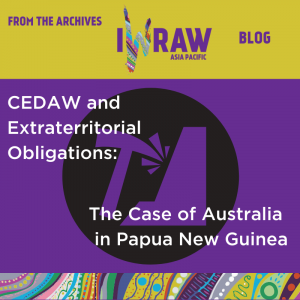 Optional Protocol to ICESCR
Optional Protocol to ICESCR  Agenda 2030 and the Sustainable Development Goals
Agenda 2030 and the Sustainable Development Goals
Extraterritorial obligations
Globalisation has led to a more connected world than ever before. As we discussed above, international financial institutions (IFIs) have played a significant role in fostering globalisation through their economic policies worldwide. The IFIs give countries like the US and UK greater decision-making power than many countries in the Global South, and are able to exert significant influence over the economic, social, and cultural rights of people elsewhere through the economic policies they implement.
Despite having responsibility for the breach of human rights, the IFIs are seldom held accountable for the adverse effects of the policies they force countries to execute. Targeting these gaps in human rights protection, a group of experts in international law and human rights adopted The Maastricht Principles on Extraterritorial Obligations of States in the area of Economic, Social and Cultural Rights on 28 September 2011.

On IWRAW Asia Pacific’s blog, activists Ruth Saovana Spriggs and Elizabeth (Sabet) Cox share their experiences of engaging with Australia’s CEDAW review to highlight rights violations against women and girls in Papua New Guinea.
Extraterritorial obligations (ETOs) have clearly defined and restated that states are not just responsible for ensuring the realisation of economic, social, and cultural rights in their own territories. They also must do so when they exercise authority, effective control, or decisive influence over states or people elsewhere. States must ensure the realisation of these rights universally, especially when they foresee the possible impacts of their actions on the realisation of human rights outside of their territories.
For example, when a trade agreement or a treaty leads to forced eviction, or limits people’s right to water or social security in the country the agreement is put in place, ETOs provide a mechanism to hold the responsible parties (states) accountable. This can be done by taking the impact of their actions into account while designing the agreements, hence preventing violations of human rights.
Through the work of civil society organisations, extraterritorial obligations have been brought to the attention of other processes, such as CEDAW. In 2016, CESR, Alliance Sud, NYU Law School Global Justice Clinic, Public Eye, and the Tax Justice Network argued that Switzerland had responsibility for the extraterritorial impacts of tax abuse (through tax havens) on women’s rights elsewhere.
When wealthy individuals or corporations shift their funds to countries like Switzerland to bypass tax policies, the low and middle-income countries are particularly hurt by financial secrecy policies. In effect, these states lose a significant amount of revenues which might constrain their ability to fulfill their human rights commitments. During its 2016 review, Switzerland faced difficult questions from the CEDAW committee. It was ultimately suggested to Switzerland that it undertakes ‘independent, participatory, and periodic’ assessment of extraterritorial effects of its financial secrecy and tax policies on human rights.
For an example of how extraterritorial obligations have been used to address the obligations of States acting within multilateral institutions, see The Impact of the EU’s Opposition to the WTO TRIPS Waiver Proposal on COVID 19 Vaccines: Sweden’s Duties as a Member State and Extraterritorial Obligations under CEDAW, the 2021 CEDAW Shadow Report submitted as part of Sweden’s review by the Third World Network, Development Alternatives with Women for a New Era (DAWN), and IWRAW Asia Pacific, on behalf of the Feminists for a People’s Vaccine.
 Optional Protocol to ICESCR
Optional Protocol to ICESCR  Agenda 2030 and the Sustainable Development Goals
Agenda 2030 and the Sustainable Development Goals

